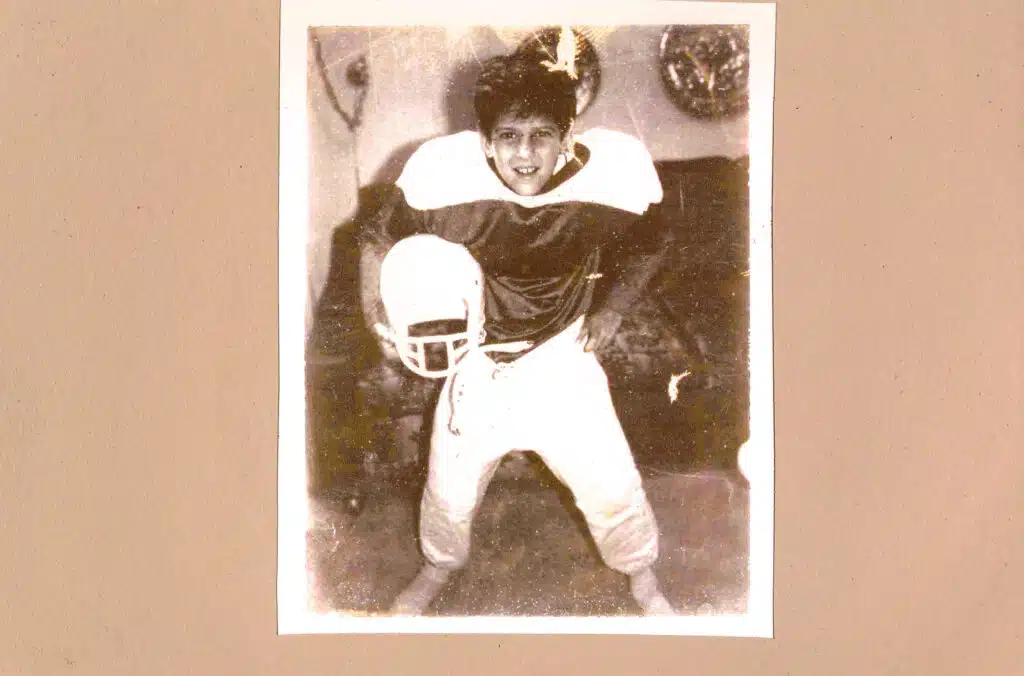(The author, shown above, in the months after JFK’s assassination.)
By Bruce Farrell Rosen,
The recently passed date of November 22 marked the 60th anniversary of the assassination of President John Fitzgerald Kennedy. For many of us of a certain age, the memory of hearing that news is etched into our brains like grooves in a record album.
I was in the third grade, living in Southern California, and we had been sent home not long after arriving at school–after the shooting but before the death had been announced.
The television was on and I will never forget the words of Walter Cronkite–putting on and then removing his glasses–doing his best to hold back surging grief as he said, “Dallas Texas, apparently official, President Kennedy died at 1:00 PM Central Standard Time..”, a reportorial tone, deep and solemn.
My parents were in shock. And I was in shock, my mind in disarray. I had adored JFK, literally loved him. I had watched his press conferences every time I had the chance to see them. I was taken by his charm, class, charisma and sense of humor, even at eight years old.
I watched television almost non stop over the next several days. And the events unfolding were bewildering: the horses hoofs upon the pavement as the carriage carried the coffin still echo through my mind; John John, the President’s young son saluting his fallen father as the procession passed; the assassination of the accused assassin, Lee Harvey Oswald, by Jack Ruby happening ‘live’ on television, as Oswald was being moved from one jail to another jail. I saw all of this. In later years, I came to realize that part of America died on November 22, 1963, and has never recovered.
There will likely always be a debate over whether there was a conspiracy to kill President Kennedy, or whether Oswald acted alone, which was the conclusion of the Warren report–the written document produced by the commission chaired by chief justice Earl Warren. I do know from listening to a telephone conversation between President Johnson and Senator Richard Russell of Georgia, released by CSPAN, that President Johnson was quite concerned in the aftermath of the assassination that forces in the US military may want to go to war with someone over this, Cuba or Russia being prime targets. He needed to convene a commission as soon as possible to come to conclusions regarding the perpetrator or perpetrators, and used some coercion on the respected Russell to join the panel. One can hear Russell resisting in the conversation, but eventually relented and joined.
There had been some serious doubt about the conclusions of the Warren report in certain circles, almost from the beginning of its release. Robert F. Kennedy, the Presidents brother and Attorney General had his doubts with regard to the conclusion, believing that there was likely a conspiracy. President Johnson could believe that Oswald pulled the trigger but had a hard time believing that there was no conspiracy whatsoever. And Senator Russell, a member of the Commission, had many doubts regarding the conclusions of the report.
It was the release of the Zapruder film, a silent 8mm color motion picture sequence shot by Abraham Zapruder with a Bell and Howell home movie camera , as President Kennedy’s motorcade passed through Dealey Plaza in Dallas that caused significant doubt with regard to the reports findings. The film, taken from a somewhat elevated position, on the side from which the President’s head wound is most visible is considered the most complete version of any photograph or film taken that day. Many people, including Dr. Robert McClelland, the emergency room doctor struggling to save the President’s life (he arrives at this judgment in an unedited interview that I viewed recently on the internet) came to believe after seeing the Zapruder film that there had to have been a shot fired from the side or from the front of the President.
There are forensics experts on both sides of the argument, each making convincing cases. Producer Rob Reiner has recently released a compelling podcast in which he believes he has solved the argument once and for all and that without a doubt there was more than one assassin and there was a conspiracy. And we have the extremely well argued book by former Los Angeles District Attorney Vincent Bugliosi–Reclaiming History, the Assassination of President John F. Kennedy– that goes to great lengths to shred every conspiracy theory every conceived regarding anything other than a lone gunman. It is a very convincing work. Personally, I will always believe that there was a conspiracy and more than one gunman. But, of course, I’ll never have closure on this.
There has been so much time and effort put into trying to understand the assassination and the ‘real truth’ behind it over the years that the Greatness of President John Fitzgerald Kennedy is sometimes overlooked. His decisive handling of the Cuban missile crisis–when a true nuclear confrontation between the United States and Soviet Union was a legitimate possibility– is a master lesson in negotiation amidst brinksmanship. His calm in the face of such ‘unthinkable consequences’ will attest to his character for all time.
Yes, it is easy to dwell too much on the assassination and miss the greatness of the man. There is a message in his inaugural address which speaks to the bitter enmity, bordering on hatred that we have in our divisive politics of today. “So let us begin anew”, he says, “remembering on both sides that civility is not a sign of weakness, and sincerity is always subject to proof. Let us never negotiate out of fear, but let us never fear to negotiate.”
And let his hear his words in Berlin, speaking to a City cut in half by a wall, communism on one side, freedom on the other : ” There are many people in the world who really don’t understand, or say they don’t, what is the great issue between the free world and the communist world: let them come to Berlin…”
I loved his sense of humor. At a rally in Ft. Worth on that tragic, fateful day he said, ” Mrs. Kennedy is organizing herself, it takes longer, but, of course, she looks better than we do when she does it…”
Yes, we had Camelot for one brief shining moment.
Bruce Farrell Rosen has retired recently after forty years as an investment manager in San Francisco. He is also an author of two books, ” Bombed in his bed the confessions of Jewish Gangster Myer Rush, and ” If you Ever Need Me, I Won’t be far away”. He has authored numerous articles for the BBC, Baseball Hall of Fame, San Francisco Chronicle, Marin Independent Journal and others. He lives in San Francisco, Calif.
Read Bruce Farrell Rosens other essays:
I Wish my Doll had Been Made of Metal: The Heartbreak of the Lahaina Inferno (Essay)
Gordon Lightfoot’s Music was the Soundtrack to My Life
Plus, watch our interview with him: Esoterica Mag’s interview with Bruce Farrell Rosen on his book, “Bombed in His Bed: The Confessions of Jewish Gangster Myer Rush.”

